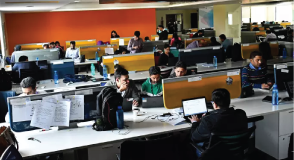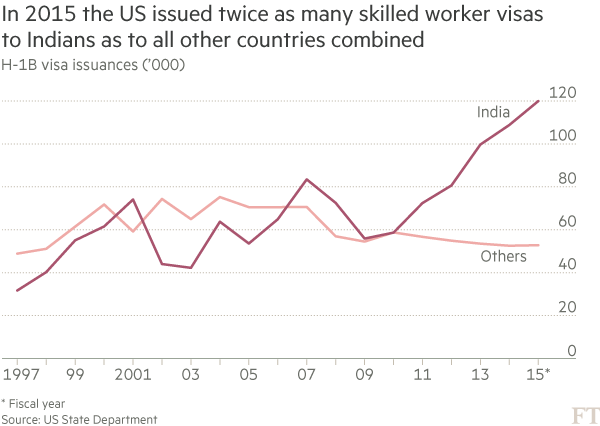US work visa threat alarms Indian IT sector

Indian executives are warning that a move by the US to limit visas for skilled workers would strike at the heart of the countries’ trade relations, sharply increasing costs for India’s $146bn IT services industry in its most crucial market.
Indian IT companies, which are heavy users of skilled H-1B visas to the US, have cut hiring from domestic university campuses after legislation was proposed that would tighten US rules on skilled immigration.
The industry is planning to send a delegation to the US this month to argue against the changes, which have prompted widespread alarm in India.
“Despite the importance that has been attributed to the Indian relationship, despite the warm words from [US President Donald] Trump, there may be measures that are taken that are seriously damaging,” said R Chandrasekhar, president of India’s National Association of Software and Services Companies.
“If the US was to curb the number of people that are taken in on H-1B visas in the area, two things can happen: either those jobs remain unfilled in the US or the job goes out of the US.”
Last month legislation was introduced at the House of Representatives that would require companies to pay H-1B immigrants at least $130,000 — more than double their previous minimum salary — unless they can prove they were unable to find a US worker to do the same job. This effective wage floor currently stands at $60,000 and would be increased in order “to protect American workers”.
Sean Spicer, Mr Trump’s press secretary, has said the White House will also consider reforming H-1B visas through an executive order, such as the one used to ban travellers from seven majority-Muslim countries.
The move has prompted a public outcry in India — two-thirds of the H-1B visas issued by the US in the 2015 fiscal year were granted to Indians, according to US state department figures. The concern is that an increase would make it too costly for Indian contractors to recruit Indian workers for jobs in the US — and would sharply constrain an industry that has become an engine of skilled job growth in the country.

The IT sector in India is still heavily reliant on its traditional, labour-intensive sources of revenue despite efforts to shift to more cutting-edge areas such as data analytics. Although they can provide some services remotely, the companies rely on sending their best employees to work directly with clients in the US.
The industry last year generated 60 per cent — or $64.8bn — of its revenues in the US, where it employed 155,000 people in 2015, according to Nasscom. After Mr Trump was elected in November, the association cut its growth outlook for the industry this financial year from 10-12 per cent to 8-10 per cent, citing “domestic and global factors impacting its performance”.
Vineet Nayar, former chief executive of HCL Technologies, the fourth-largest Indian IT services company by revenue, said US companies would also be hit: “Facebook, Microsoft — everybody applies for H-1B.”
US-based companies such as IBM, Cognizant and Accenture are among the main applicants for H-1B visas, according to My Visa Jobs, an immigration consultancy that compiles data on applications.
India’s ministry of external affairs was forced to complain to the Trump administration after news about the new bill caused a slump in IT stocks last month. Sector leader Tata Consultancy Services lost more than 7 per cent of its market value. “India’s interests and concerns have been conveyed both to the US administration and the US Congress at senior levels,” the ministry said.
Companies have begun to take pre-emptive steps, according to placement advisers on college campuses. “[Mr Trump] will impact the employment opportunity for Indian students,” said Kanwal Kapil, chairperson of placements at the Management Development Institute in Gurgaon, which has seen IT hiring fall 26 per cent compared with last year.
“We cannot rule out the fact that the scepticism has some [relation] to Mr Trump’s future policies,” said Saveeta Mohanty, placements adviser at the Xavier Institute of Management and Entrepreneurship, which expects a 40 per cent fall in IT hiring this season.
Welingkar Institute of Management Development & Research said hiring had fallen 30-40 per cent. All three institutions claimed there was less take-up from TCS and Infosys, which filed the most applications for H-1B visas last year, according to My Visa Jobs. The average salaries for applicants were significantly below the new proposed $130,000 mark, at $79,201 for Infosys and $69,648 for TCS.

